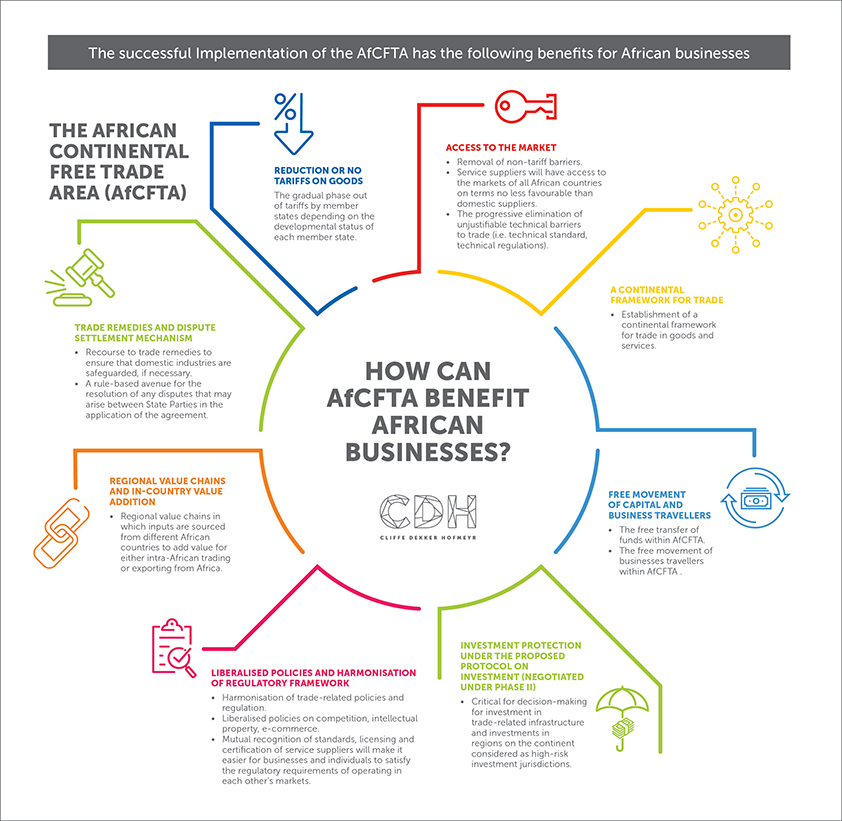CDH Insights - African Continental Free Trade Area
At a glance
- The African Continental Free Trade Area (AfCFTA) is an agreement signed by 54 African states to create the world's largest trade area, promoting free movement of goods, services, and investments.
- The AfCFTA aims to increase intra-Africa trade volume by 81% and total African exports by 29%, leading to a GDP increase of $450 billion and lifting 30 million people out of extreme poverty by 2035.
- The agreement covers trade in goods and services, investment, intellectual property, competition policy, and includes provisions for the free movement of persons and establishment within Africa. Non-compliance may result in penalties and investigations.
What is the African Continental Free Trade Area?
Signed on 21 March 2018 by 44 of Africa's 55 states, the agreement establishing the African Continental Free Trade Area ("AfCFTA Agreement") came into force, after reaching the required level of ratifications, on 30 May 2019. The AfCFTA Agreement has ushered in the world's largest trade area (by the number of participating states) with a population of about 1.3 billion people and a combined GDP of U$3.4 trillion.
Today, 54 out of 55 African states have signed the AfCFTA Agreement, with Eritrea being the sole non-signatory. The AfCFTA launched its operational phase in July 2019 and trade under the AfCFTA Agreement commenced on 1 January 2021.
The World Bank estimates that the effective implementation of the AfCFTA Agreement will, among others, increase the volume of intra-Africa trade by 81% by 2035, and increase total African exports by 29%. That in turn implies an increase of GDP by $450 billion or 7% per annum, lifting at least 30 million people out of extreme poverty by 2035.
What are the main objects of the AfCFTA Agreement?
- To create a single market for the trade goods and services on the continent, facilitated by the free movement of business persons and investments.
- To significantly increase economic growth and development on the continent through an integrated single market for goods and services.
The AfCFTA Agreement creates a legal framework covering the following critical areas:
- Trade in goods
- Trade in services
- Investment
- Intellectual property
- Competition policy
In parallel with the adoption of the AfCFTA Agreement, the Protocol to the Abuja Treaty was opened for signature at the 2018 African Union ("AU") Summit in Kigali. Yet to come into force, the Protocol acts as a catalyst to the African economic community, championing the free movement of persons, right of residence and right of establishment within Africa. Its provisions include the intention to abolish visa requirements and the introduction of the African Passport. The Treaty also obliges State Parties to mutually recognise academic, professional and technical qualifications.
The Pillars of the AfCFTA Agreement
The implementation of AfCFTA will occur in phases. Phase I covers Trade in Goods, Trade in Services and the Rules and Procedure on the Settlement of Disputes.
Effective 1 January 2021, the integral instruments that regulate trade in AfCFTA are (with ongoing negotiations on several annexures):
The Protocol on Trade in Goods
Annexures
- Schedule of Tariff Concessions
- Rules of Origin
- Customs Cooperation and Mutual Administrative Assistance
- Trade Facilitation
- Non-Tariff Barriers
- Technical Barriers to Trade
- Sanitary and Phytosanitary Measures
- Transit
- Trade Remedies
The Protocol on Trade in Services
Annexures
- Schedule of Specific Commitments
- Most Favoured Nation Exemptions(s)
- Air Transport Services
- List of Priority sectors
- Framework of Regulatory Co-Operation
The Protocol on the Rules and Procedure on the Settlement of Disputes
Annexures
- Working Procedure of the Panel
- Expert Review
- Code of Conduct for Arbitrators and Panellists
As part of Phase II, the Protocol on Investment, Protocol on Competition Policy and Intellectual Property Rights is still being negotiated. There is also discussion on a Protocol on E-Commerce – which will either be under Phase II or Phase III negotiations.

WHAT will be the benefits for business players in Africa?
- Reduction or no tariffs on goods [gradual phase out of tariffs by member states depending on developmental status of each member state]
- Removal of non-tariff barriers to access the market.
- The progressive elimination of unnecessary and unjustifiable technical barriers (i.e. technical standard, technical regulations) to trade.
- Establishment of a continental framework for trade in goods and services
- Employees of businesses will have free movement within AfCFTA .
- Free movement of capital (transfer of funds).
- Investment protection under the Protocol on Investment.
- Liberalised policies on competition and intellectual property, e-commerce.
- Service suppliers will have access to the markets of all African countries on terms no less favourable than domestic suppliers.
- Mutual recognition of standards, licensing and certification of service suppliers will make it easier for businesses and individuals to satisfy the regulatory requirements of operating in each other’s markets
- The creation of regional value chains in which inputs are sourced from different African countries to add value before exporting
- Recourse to trade remedies to ensure that domestic industries are safeguarded, if necessary
- A dispute settlement mechanism provides a rule-based avenue for the resolution of any disputes that may arise between State Parties in the application of the agreement;
WHO can access the benefits under AfCFTA?
- African businesses incorporated within a member state of the AfCFTA. Currently only 36 States have deposited their respective instruments of ratification with the Secretariat.
HOW can you access the benefits?
- African businesses planning to export / import goods intra-Africa under the AfCFTA will need to ensure the goods comply with the requirements set out in several of the annexures to the AfCFTA Agreement (as domesticated by each State). Of particular importance will be the import requirement under Annex: Rules of Origin – aspects of which is still being negotiated by member states. Compliance by businesses with, amongst others, the "Rules of Origin" requirements for the import/export of goods intra-Africa is critical to derive benefits under the AfCFTA. The "Rules of Origin" are essentially "local content requirements" to ensure that foreign goods (i.e. Chinese, American etc) do not derive the benefits under the AfCFTA. This encourages foreign manufacturers and producers of goods to establish manufacturing/production hubs on the continent to benefit from the preferential trade regime under the AfCFTA Agreement. In turn this contributes to the industrialisation of the continent's economy to realise the AfCFTA's objectives.
- For the purpose of establishing new enterprises for regional manufacturing and production hubs, there may well be a requirement for investors (whether African or foreign) to assess whether a new or restructured enterprise qualifies for protection under instruments such as the Investment Protocol (being negotiated under phase II) of the AfCFTA Agreement. The Protocol on Investment will have separate ratification requirements to the AfCFTA Agreement for each signatory State. The Protocol on Investment will be of particular importance to Intra-Africa investors (or investors structured as such) as it intends to provide investors protection for investments and related guarantees such as:
- Expropriation and Compensation: Guarantees against unlawful expropriation;
- National Treatment;
- Most-Favoured Nation Treatment;
- Full protection and security;
- Fair and Equitable Treatment or Minimum Standard of Treatment Requirements (to the extent included, due to its controversial nature);
- Investor-State Dispute Resolution (either direct recourse to international arbitration by investors against state or an African Investment Court or restriction to domestic court system);
- Transfer of Funds;
- The Protocol on Investment is expected to align to the Draft Pan-African Investment Code, December 2016 which has as its objective to promote, facilitate and protect investments that foster the sustainable development of African States and in particular, the state where the investment is located.
HOW do business players access the benefits under AfCFTA
- Understanding the Rules and related domestic legislation (Domestication of Rules): customs and non-customs requirements.
- Ensuring businesses conform to specific rules to derive benefits.
- Structure business to the extent necessary – taking into account existing bilateral or multilateral investment agreements, domestic legislation of each host State and eventually the Protocol on Investment.
Enforcing the AfCFTA Benefits
- Report non-compliance by State Parties of Rules under the AfCFTA Agreement and related instruments.
- The ability to lodge complaints with the state from which you derive nationality against the non-compliance by member states your business is conducting trade or has an new established business.
- Ability to put pressure on state of your nationality to initiate disputes under the Dispute Settlement Protocol.
WHY is the AfCFTA necessary at this moment in time?
African businesses must be the driving force to realise the objectives of AfCFTA. Whether you are a producer, supplier, distributor or retailer of goods or a services provider (banking & financial services, telecommunications, professional services etc) there is tremendous scope for growth and development on the continent.
WHAT opportunities does the AfCFTA present to African businesses ?
- Expansion of revenue streams by opening up markets that were previously difficult to access;
- Connecting businesses with trading partners on the continent;
- Establishing new trade routes;
- Establishes new manufacturing / assembly hubs or service centres;
- Domestication of Rules and harmonisation of regulation.
The information and material published on this website is provided for general purposes only and does not constitute legal advice. We make every effort to ensure that the content is updated regularly and to offer the most current and accurate information. Please consult one of our lawyers on any specific legal problem or matter. We accept no responsibility for any loss or damage, whether direct or consequential, which may arise from reliance on the information contained in these pages. Please refer to our full terms and conditions. Copyright © 2026 Cliffe Dekker Hofmeyr. All rights reserved. For permission to reproduce an article or publication, please contact us cliffedekkerhofmeyr@cdhlegal.com.
Subscribe
We support our clients’ strategic and operational needs by offering innovative, integrated and high quality thought leadership. To stay up to date on the latest legal developments that may potentially impact your business, subscribe to our alerts, seminar and webinar invitations.
Subscribe



